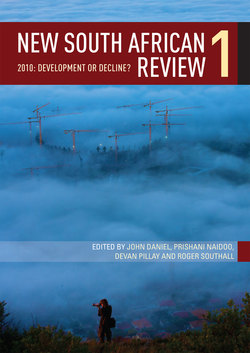Читать книгу New South African Review 1 - Anthony Butler - Страница 15
На сайте Литреса книга снята с продажи.
Protest at incapacity
ОглавлениеRecent years have been characterised by numerous and highly publicised protest actions against governments at provincial and local levels, choreographed in much of the media as protests against lack of ‘service delivery’. Far too often for comfort, these have become interlaced with outbursts of popular violence against perceived community outsiders, usually characterised as ‘xenophobia’. In many such cases, violence against persons is compounded with violence against property, often public facilities such as schools, libraries or municipal offices. Protest is therefore often dismissed by officialdom as stoked by malcontents who have oppositional political motives, or by wider society as irrational and primitive. Social protest is, however, a highly complex phenomenon. Amongst the factors that would seem to be involved are feelings of relative deprivation, high levels of inequality within an increasingly consumerist society, the failures of the educational system, high unemployment among blacks (notably young men), a lack of entrepreneurship and capital among South African black urban dwellers which is often visibly exposed by more successful foreign migrants, resentments against perceived corruption in government, and the lack of accountability of politicians and arrogance of officials. Lack of regard for the law (in significant part an inheritance of apartheid) combined with inadequate law enforcement creates a context in which protests often turn violent, a tendency fuelled by resort to violent methods of crowd control by the police. In turn, violent protests are themselves a collective manifestation of the wider violence in South African society, reflective of the lack of social coherence in a society still highly divided along lines of class, race, ethnicity, gender and geography (Bruce below; RSA 2009b).
Tales about the failures of provincial governments and municipalities to deliver services and of a decline in standards are legion, and are often interspersed with indications of considerable corruption and cronyism. Such narratives represent more than post-colonial melancholy, for there is evidence enough that all is not as it should be: for instance, provincial and municipal delivery failure is often matched by inability to spend annual budgets. Numerous municipalities, including some metros, are effectively bankrupt and in total financial disarray. Nonetheless, although there is substantial indication of incompetence and incapacity at levels of government which most immediately affect ordinary citizens, there is simultaneously clear evidence of substantial improvements in the access of poorer communities and households to services ranging from housing to running water and electricity. In addition, through its social grants network, the government now contributes the greatest single source of income to a third of all African households, while as much as a quarter of the population receives monthly grants from the state (Cronje 2009). So why, we may ask, are the poor so damned ungrateful?
The answer is beyond disaggregation here. However, what it adds up to is a striking loss of the ANC’s authority and control over society – especially over the working class – and an emergent underclass of deprived and unemployed South Africans.
Hitherto, the revolt of the underprivileged has not taken a coherent political form (although Zuma’s rise to power, backed by majority elements within Cosatu and the SACP, undoubtedly had a significant class dimension). However, ironically, analysts of both the left (Pillay 2009) and the right (Cronje 2009) combine in projecting a strong possibility of growing levels of protest leading to Cosatu and the SACP breaking with the Alliance and linking up with social movements to threaten the ANC’s political hegemony. This is scarcely the prospect envisaged by white capital in 1994. Nor is any resulting scenario – an erosion of governmental control of the townships akin to the NP’s experience in the 1980s; growing anti-capitalist protest and class warfare culminating in an electoral victory of a new left party over the ANC; or continuing rule by the ANC, but with reduced moral and political authority and greater reliance on patronage and coercion – promising to the continued survival of a ‘reform bargain’, especially one increasingly reliant upon infusions of foreign investment.
